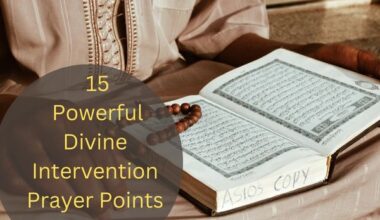In the realm of spiritual disciplines, fasting and prayer stand as pillars of devotion, offering a sacred space for introspection, connection, and growth. This article looks into the profound practice of fasting and prayer, exploring what not to do when fasting and praying, the depths of its significance, and offering guidance on how to approach it with reverence.
Whether undertaken for religious observance, personal reflection, or a combination of both, fasting and prayer have the power to transform the spirit, fostering a deeper connection with the divine. Join us on this contemplative journey as we unravel the essence of fasting and prayer and explore the profound impact they can have on one’s spiritual journey.
What Not to Do When Fasting and Praying
Understanding what not to do when fasting and praying is crucial for a meaningful spiritual experience. It involves avoiding actions that counteract the purpose of the fast, such as indulging in negative behaviors, gossip, or overindulgence. It also means refraining from a self-centered focus, embracing humility, and maintaining sincerity in the spiritual journey.
It cautions against using fasting as a mere ritual without genuine reflection. Instead, one should strive for a holistic approach, incorporating prayer, self-discipline, and a sincere connection with the divine, fostering a transformative and spiritually enriching fasting experience.
When fasting and praying, it’s important to approach this spiritual discipline with reverence and mindfulness. Here are things to avoid:
1. Neglecting Physical Health: Fasting should not compromise your health. Avoid extreme measures that lead to dehydration or nutritional deficiencies. Consult a healthcare professional if you have health concerns.
2. Pride and Boasting: Fasting is a personal, humble act. Avoid boasting about your fast, as it can lead to pride. Jesus cautioned against publicizing fasting for personal acclaim (Matthew 6:16–18).
3. Empty Rituals: Fasting without a sincere heart and meaningful prayer is devoid of purpose. Ensure that your fast is accompanied by genuine spiritual reflection and communion with God.
4. Judging Others: Avoid passing judgment on those who may not be fasting or practicing it differently. Everyone’s spiritual journey is unique, and judgment contradicts the humility fasting promotes.
5. Neglecting Others: Fasting should enhance empathy, not diminish it. Don’t neglect your responsibilities to family, work, or the community. Balancing spiritual pursuits with practical duties is crucial.
6. Rigid Legalism: Fasting should be a spiritual discipline, not a legalistic obligation. Avoid turning it into a rigid set of rules; instead, let it be a fluid expression of your devotion.
7. Anger and Irritability: Fasting can affect mood and energy levels. Be mindful not to allow irritability or anger to overcome you. Seek patience and understanding in your interactions.
8. Neglecting Personal Growth: Fasting is an opportunity for personal and spiritual growth. Avoid stagnation by engaging in prayer, meditation, and studying scripture to deepen your understanding.
9. Spiritual Pride: Guard against developing a sense of spiritual superiority due to fasting. Humility is a core virtue in spiritual practices, and pride can hinder genuine connection with God.
10. Lack of Gratitude: Fasting is an expression of reliance on God. Avoid neglecting gratitude in your prayers. Express thankfulness for blessings, acknowledging your dependence on God’s provision.
What To Do During Fasting and Praying
During fasting and praying, it’s essential to approach this spiritual practice with intentionality and mindfulness. Here are some constructive actions to undertake:
1. Set Clear Intentions Before starting your fast, establish clear spiritual goals and intentions. Whether seeking guidance, repentance, or a deeper connection with God, having a purpose enhances the meaning of your fast.
2. Structured Prayer Time: Dedicate specific times for prayer throughout the day. Create a structured prayer routine to maintain focus and ensure meaningful communion with the divine.
3. Reflect on Scripture: Incorporate reading and reflection on sacred texts into your routine. Choose verses that align with your intentions, providing spiritual guidance and encouragement.
4. Journaling: Keep a spiritual journal to document your thoughts, prayers, and reflections during the fasting period. Journaling can deepen your understanding of the spiritual journey and serve as a record of personal growth.
5. Meditation: Practice meditation to quiet the mind and create a receptive space for spiritual insights. Focus on your breath, a specific scripture, or a prayer mantra to enhance mindfulness.
6. Express Gratitude: Use this time to express gratitude for the blessings in your life. Gratitude fosters a positive mindset and invites more profound spiritual experiences.
7. Acts of Kindness: Incorporate acts of kindness and service into your fasting routine. Whether through charitable deeds or by supporting others, generosity aligns with the spirit of fasting.
8. Seek forgiveness: Take time to seek forgiveness from God and others for any transgressions. A humble heart is receptive to divine mercy.
9. Community Involvement: Engage with a spiritual community if possible. Attend communal prayers, gatherings, or discussions to share and enhance the collective spiritual experience.
10. Stay Hydrated: If your fast includes abstaining from food and drink, prioritize hydration during non-fasting hours. Dehydration can hinder focus and concentration in prayer
Conclusion
As we draw the curtains on our exploration of fasting and prayer, let the echoes of devotion linger in our hearts. Fasting, a physical act of restraint, and prayer, a spiritual communion, together form a harmonious symphony of worship. May the lessons learned in the stillness of fasting and the earnestness of prayer resonate in our daily lives, guiding us towards greater compassion, humility, and connection with the divine.
Whether you embark on this spiritual journey as a ritual of faith or a personal quest for growth, may the echoes of your prayers linger, bringing forth a sense of peace, purpose, and a deeper understanding of the sacred within






